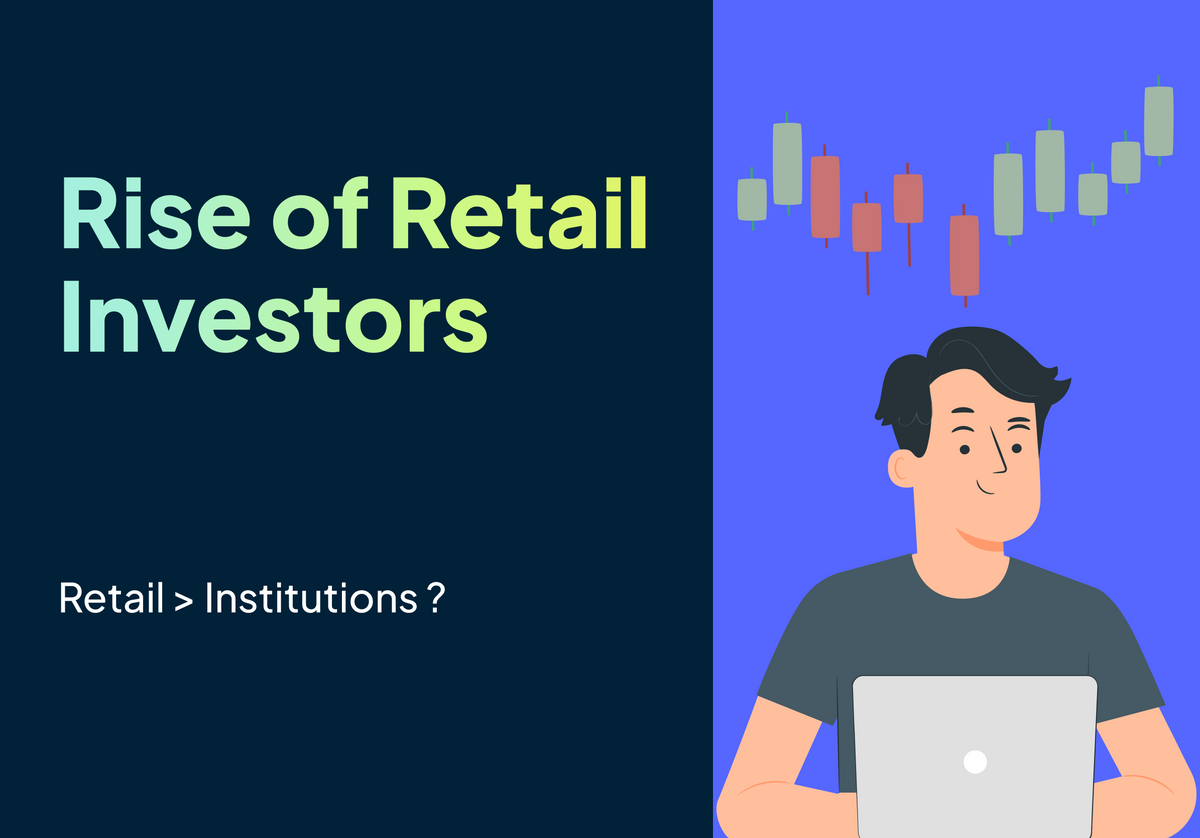The Rise Of Retail Investors: How The Digital Age Is Shaping The Landscape
Retail investors are stronger than ever, with the rise of online knowledge, tools and easy access to the Indian stock markets. Know the factors and potential of retail investors.

Age Of Retail Investors
Trading or Investing is no longer a complex activity that requires a lot of capital or expertise in the field.
Nowadays, anyone can join this community with just a smartphone and a couple hundred bucks in their bank account. Thanks to online trading platforms, the stock market is at your fingertips, whether you're a pro or just starting out.
These online trading platforms are at the heart of a revolution in investing for regular people. They provide easy access to markets, clear information, and multiple other tools. This lets millions join the stock market and make smart choices from home, no matter their financial background.
This fact can be reiterated with the help of the survey, which states that, in recent years, the world has witnessed a remarkable 52% (expected to grow to over 61% by the end of 2030) participation of retail investors in global stock markets. This unprecedented rise in retail investors has reshaped the investment landscape, challenging traditional notions of market dynamics and democratising access to financial opportunities.
Growth Of Stock Market Participants In India
According to a survey, India is the 2nd most stock-smitten country in the world. The total number of new CDSL and NSDL account holders in India continues to rise, with 3.39 million accounts opened in January 2022, with the total number of accounts being 28.85 million to date.
The rise of social media and investment communities has played a critical role in attracting new retail investors. Young professionals, like engineers, doctors, entrepreneurs, etc., have actively started investing in stocks as they seek to diversify their portfolios and generate wealth. Furthermore, platforms like Twitter, YouTube, and online forums have facilitated the sharing of investment ideas and strategies, creating a sense of community among retail investors and encouraging more individuals to participate in the stock market.
The surge in retail investors has disrupted the traditional dynamics of stock markets, with profound implications for individual investors and institutional players. Armed with newfound knowledge and digital tools, retail investors have become a formidable force capable of challenging established markets.
The Role Of FIIs And DIIs
For those who are unaware of these terms, FIIs refer to Foreign institutional investors such as mutual funds, pension funds, and hedge funds based outside the country but investing in the domestic market. These investors bring significant capital, expertise, and global market perspectives, which can substantially impact stock prices and market sentiment.
On the other hand, DIIs or Domestic Institutional Investors are institutional investors operating within the domestic market. They include entities such as insurance companies, mutual funds, and banks. DIIs play a crucial role in providing stability to the market by investing in a wide range of securities and providing liquidity.
Traditionally, institutional investors have dominated stock markets due to their ability to invest large sums of money and their expertise in financial markets. Their actions can influence market trends, drive stock prices, and shape market sentiment.
However, there has been a noticeable shift in the balance due to the rise of retail investors. The increasing participation of individual investors, driven by greater access to information, online trading platforms, and financial literacy, has disrupted the traditional dominance of institutional investors.
Although this is a good thing, this shift in balance has implications for market stability and volatility. The increased participation of retail investors can introduce higher volatility in stock prices due to their different investment strategies, shorter investment horizons, and susceptibility to herd behaviour. Market stability can be affected as the actions of retail investors may deviate from the fundamentals of the underlying companies, leading to price distortions.
Retail investor participation in emerging markets, including India, differs from that in developed markets. Developed markets have a higher proportion of retail investors than emerging markets, where institutional investors traditionally dominate. In developed markets, retail investors have long been active participants, leveraging their investment knowledge and access to information.
There are valuable lessons to be learned from developed markets when it comes to retail investor participation. One important lesson is the significance of initiatives that promote financial literacy among retail investors. Educating individuals about investing can empower them to make informed decisions and navigate the market more effectively.
How Social Media Is A Key Driver
Technological advancements have played a pivotal role, as online trading platforms and mobile applications have made it convenient for individuals to enter the stock market with just a few clicks. Moreover, the widespread availability of market information through online resources, financial news portals, and social media has empowered retail investors by providing them with valuable insights and research reports.
Several social media platforms can significantly benefit retail inventors by providing them with opportunities for exposure, customer engagement, and market research.

There’s an incident involving the subreddit community r/WallStreetBets, where retail investors collectively coordinated a massive buying spree of GameStop (GME) stock, which resulted in a massive rally in the stock price.
This movement gained traction through memes, discussions, and analyses shared within the Reddit group and spread across other social media platforms like Twitter and YouTube.
This incident shows the power of social media and how much influence it can exert in the stock market game.
In this case, the power of social media resulted in a surge of interest and investment from retail investors who wanted to join the movement and potentially profit from the short squeeze. It sparked a significant increase in GameStop's stock price and garnered attention from mainstream media and regulatory bodies.
The Road Ahead: What’s In Store For Retail Investors?
The future holds exciting opportunities for retail investors, with social media assured to change the investment game significantly. As social media platforms continue to evolve and expand, retail investors can leverage these platforms to access real-time market information, engage with industry experts, and collaborate with like-minded investors.
According to a study by Statista, the number of social media users worldwide is projected to reach 4.41 billion by 2025, indicating the immense potential for retail investors to tap into a vast network of information and investment opportunities.
With social media's ability to democratise access to financial insights and connect investors globally, retail investors can expect increased transparency, improved decision-making, and a more inclusive investment landscape.
Looking at these data pointers, the future looks bright for retaining Investors. To learn more about systematic trading & investing, check out the Investmint app and give a boost to your trading journey.
Summary
- Retail Investing Revolution: Online platforms have made stock market participation inclusive and accessible, with anyone able to invest from their smartphone.
- Online Tools and Knowledge: Online trading tools and information have empowered millions, even those new to investing, to make informed decisions.
- Social Media Influence: Social media and online communities are driving a surge in retail investors, reshaping market dynamics.
- Future Potential: As social media evolves, retail investors can expect increased transparency, better decision-making, and a more inclusive investment landscape.
Want to read more of such interesting articles? Click on the Subscribe button, and receive the next release in your inbox.



